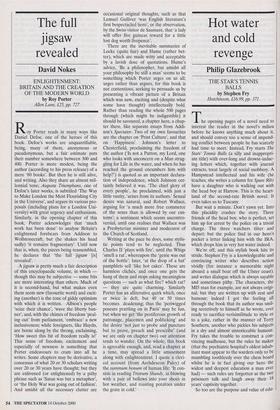The full jigsaw revealed
David Nokes
ENLIGHTENMENT: BRITAIN AND THE CREATION OF THE MODERN WORLD by Roy Porter Allen Lane, £25, pp. 727 Ray Porter reads in many ways like Daniel Defoe, one of the heroes of this book, Defoe's works are unquantifiable, being, many of them, anonymous or pseudonymous, but a fair estimate puts their number somewhere between 300 and 400. Porter is more modest, being the author (according to his press release) of a mere '80 books'. But then he is still alive, and writing. Also they share an almost mil- lennial tone; Augusta Triumphans, one of Defoe's later works, is subtitled 'The Way to Make London the Most Flourishing City in the Universe', and argues its various pro- posals (including plans for a London Uni- versity) with great urgency and enthusiasm. Similarly, in the opening chapter of this book, Porter acknowledges that 'much work has been done' to analyse Britain's enlightened forebears from Addison to Wollstonecraft, but (he shakes his head sadly) 'it remains fragmentary'. Until now that is, when, the pieces being reassembled, he declares that 'the full jigsaw [is] revealed'.
A jigsaw is pretty much a fair description of this encyclopaedic volume, in which though this may be subjective — some bits are more interesting than others. Much of it is second-hand, but what makes even them seem new (favourite word) and excit- ing (another) is the tone of giddy optimism with which it is written. Albion's people `seize their chance', 'wave the liberty ban- ner', and, with the chimes of freedom 'peal- ing out' from parliament, 'embrace' a new inclusiveness; while foreigners, like Haydn, are borne along by the throng, exclaiming, 'How sweet this bit of freedom really is!' This sense of freedom, excitement and especially of newness is something that Porter endeavours to cram into all he writes. Some chapters may be derivative, a consensus of what 20 or 30 scholars writing over 20 or 30 years have thought; but they are enlivened (or enlightened) by a pithy phrase such as 'Satan was but a metaphor', or 'the Holy War was going out of fashion'. And amidst all the necessary clutter are occasional original thoughts, such as that Lemuel Gulliver 'was English literature's first bespectacled hero', or the observation, by the Swiss visitor de Saussure, that 'a lady will offer five guineas reward for a little lost dog worth fivepence'.
There are the inevitable summaries of Locke (quite fair) and Hume (rather bet- ter), which are made witty and acceptable by a lavish dose of quotations. Hume's advice, 'Be a philosopher, but amidst all your philosophy be still a man' seems to be something which Porter urges on us all; urges rather than argues, for this book is not contentious, seeking to persuade us by presenting a vibrant picture of a Britain which was new, exciting and (despite what some have thought) intellectually bold. Rather than reading the whole 500 pages through (which might be indigestible) it should be savoured, a chapter here, a chap- ter there, like separate essays from Addi- son's Spectator. Two of my own favourites are the chapter on 'Print Culture', and that on 'Happiness'. Johnson's letter to Chesterfield, proclaiming the freedom of the author Cis not a Patron, my Lord, one who looks with unconcern on a Man strug- gling for Life in the water, and when he has reached the ground encumbers him with help?') is quoted as an important declara- tion of independence, which Johnson cer- tainly believed it was. 'The chief glory of every people', he proclaimed, with just a little vanity, 'arises from its authors.' Sexual desire was natural, said Robert Wallace, arguing for 'a much more free commerce of the sexes than is allowed by our cus- toms'; a sentiment which seems uncontro- versial, until one realises that Wallace was a Presbyterian minister and moderator of the Church of Scotland.
Writing at the pace he does, some stylis- tic points tend to be neglected. Thus Charles II 'plays with fire', until the Whigs `smell a rat', whereupon the 'genie was out of the bottle; later, 'at the drop of a hat' pamphlets sell 'like hot cakes'. These are harmless clichés, and once one gets the hang of them and stops asking meaningless questions — such as what fire? which rat? — they are quite charming. Similarly Porter has an alliterative quirk which, once or twice is deft, but 40 or 50 times becomes deadening; thus the 'periwigged poseurs prattling on in Paris' may be fun, but when we get 'the pestiferous growth of patronage, placemen and politicking' and the desire 'not just to probe and puncture but to prove, preach and prescribe' (and we are only on chapter two) our attention tends to wander. On the whole, this book is agreeable enough, and, read a chapter at a time, may spread a little amusement along with enlightenment. I quote a cleri- cal account (from Archdeacon Paley) of the summum bonum of human life: 'It con- sists in reading Tristram Shandy, in blowing with a pair of bellows into your shoes in hot weather, and roasting potatoes under the grate in cold.'


















































































 Previous page
Previous page